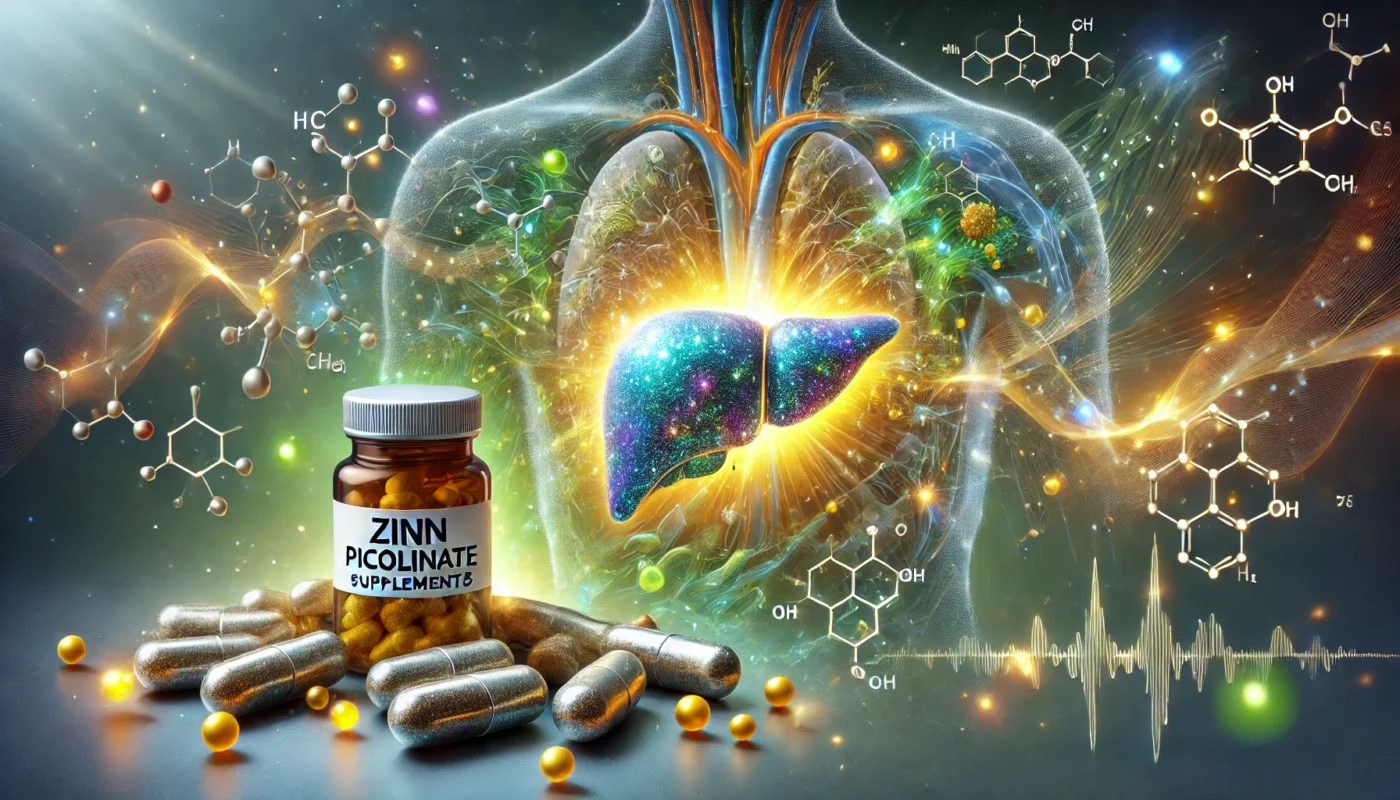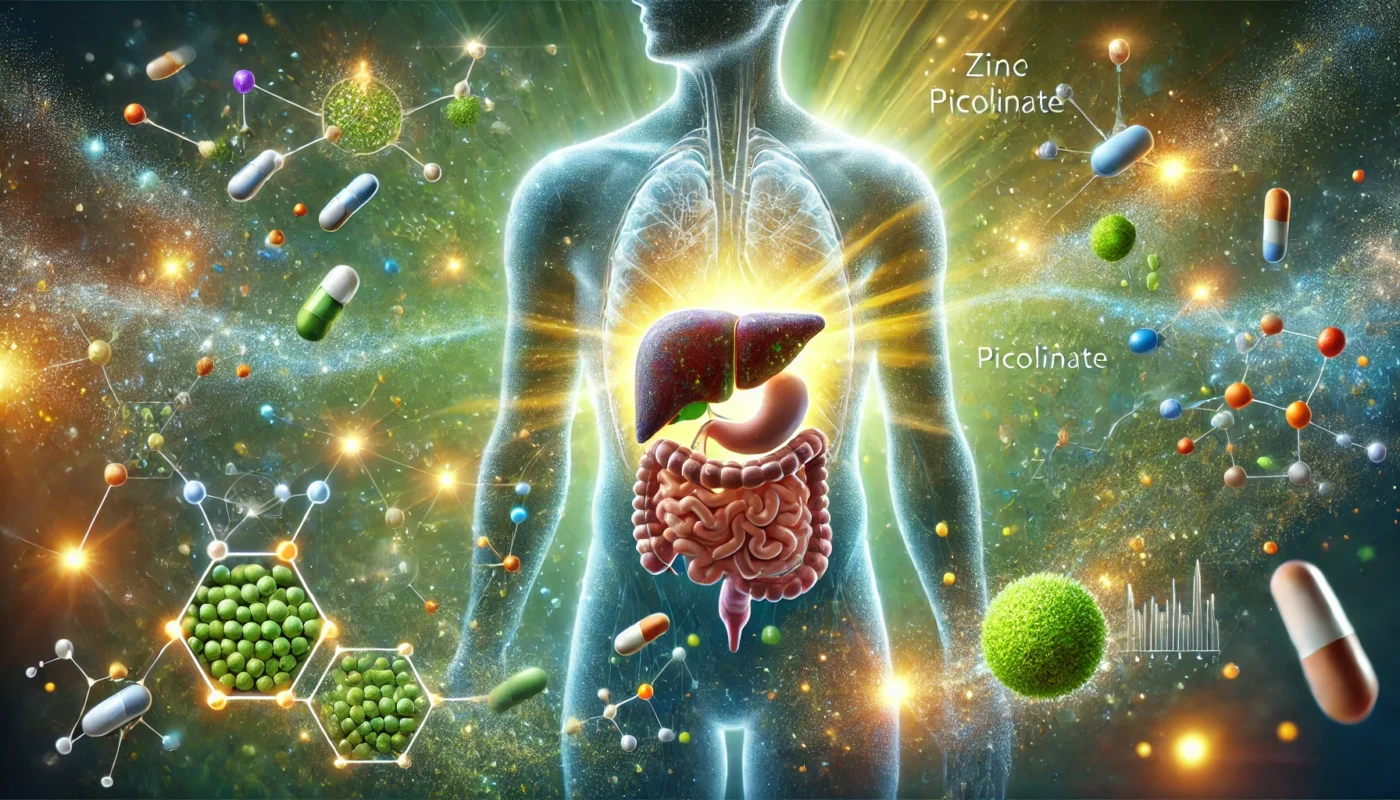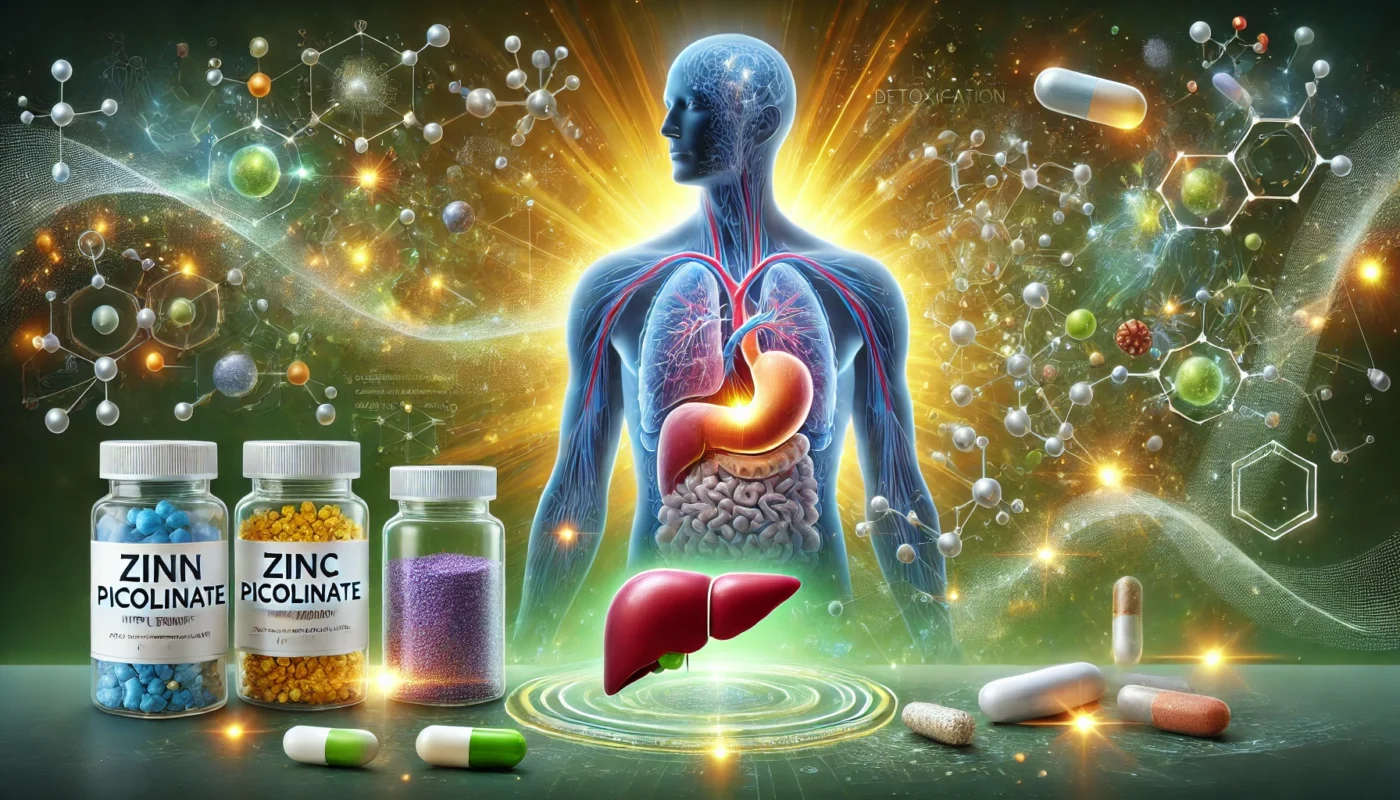The liver is the body’s primary detoxification organ, responsible for filtering and eliminating harmful substances such as toxins, medications, and metabolic waste. To perform these complex tasks, the liver relies on a variety of enzymes and detoxification pathways, all of which depend on specific nutrients to function effectively. Among these, zinc plays a critical role in supporting liver health and enhancing its detoxification capacity.
Zinc picolinate, a highly bioavailable form of zinc, has gained attention for its ability to bolster liver enzyme activity and facilitate natural detoxification processes. This article delves into the science behind zinc picolinate’s role in liver health, its mechanisms of action, and how it can help maintain the body’s natural detoxification systems.
You May Also Like:
The Connection Between Zinc Picolinate and Antiviral Immunity: What Science Reveals
Zinc Picolinate and Teen Hormonal Health: Supporting Balanced Growth
Zinc Picolinate for Liver Detoxification: Clearing Toxins Naturally is an original (HSLHealing) article.
The Liver’s Role in Detoxification
The liver performs a wide array of functions to keep the body free from harmful substances. Detoxification primarily occurs in two phases:
- Phase I Detoxification:
Enzymes such as cytochrome P450 oxidize toxins, converting them into intermediate metabolites. These metabolites are often more reactive and require further processing. - Phase II Detoxification:
Conjugation enzymes attach chemical groups (e.g., glutathione, sulfate, or methyl groups) to these intermediates, making them water-soluble for excretion via urine or bile.
Without proper nutritional support, these processes can become inefficient, leading to toxin accumulation, oxidative stress, and liver damage.

Why Zinc Is Essential for Liver Detoxification
Zinc is a trace mineral required for over 300 enzymatic reactions in the body, many of which directly or indirectly impact liver detoxification. Its benefits include:
- Supporting Detoxification Enzymes:
Zinc is essential for the activity of alcohol dehydrogenase, aldehyde dehydrogenase, and other enzymes involved in Phase I and Phase II detoxification. - Regulating Antioxidant Defenses:
Zinc enhances the production of superoxide dismutase (SOD), a critical antioxidant enzyme that neutralizes free radicals generated during detoxification. - Reducing Inflammation:
Zinc modulates inflammatory cytokines, preventing chronic liver inflammation that can impair detox pathways. - Maintaining Cellular Integrity:
Zinc stabilizes cell membranes and protects hepatocytes (liver cells) from damage caused by toxins and oxidative stress. - Improving Metabolic Function:
Zinc is involved in lipid metabolism and bile production, both of which are crucial for eliminating fat-soluble toxins.
What Is Zinc Picolinate?
Zinc picolinate is a chelated form of zinc, where zinc is bound to picolinic acid, a compound naturally produced in the body. This form of zinc offers superior absorption compared to other forms, such as zinc sulfate or zinc oxide, making it an ideal supplement for supporting liver health and detoxification.
Zinc Picolinate supports liver detoxification, aiding in the elimination of toxins and promoting optimal liver function—Order Now on Amazon!

How Zinc Picolinate Supports Liver Detoxification
1. Activating Detoxification Enzymes
Zinc is a cofactor for enzymes involved in both phases of detoxification. By supporting enzyme activity, zinc picolinate enhances the liver’s ability to process and eliminate toxins.
- Study Insight: A study in Toxicology and Applied Pharmacology found that zinc supplementation increased the activity of Phase I detoxification enzymes, improving the clearance of environmental toxins.
2. Reducing Oxidative Stress
The detoxification process generates reactive oxygen species (ROS), which can damage liver cells if not neutralized. Zinc picolinate boosts antioxidant defenses, protecting the liver from oxidative damage.
- Clinical Evidence: Research in Free Radical Biology and Medicine showed that zinc supplementation reduced oxidative stress markers in individuals with non-alcoholic fatty liver disease (NAFLD).
3. Modulating Inflammation
Chronic liver inflammation can impair detoxification pathways and lead to conditions such as fibrosis or cirrhosis. Zinc picolinate’s anti-inflammatory properties help maintain liver function.
- Research Finding: A study in Hepatology reported that zinc supplementation decreased levels of pro-inflammatory cytokines, such as interleukin-6 (IL-6) and tumor necrosis factor-alpha (TNF-α), in patients with liver disease.
Zinc Picolinate aids liver enzymes in detoxifying harmful substances for improved health—Shop Now on Amazon!

4. Supporting Glutathione Production
Glutathione is a powerful antioxidant and a key player in Phase II detoxification. Zinc supports the enzymes that produce and regenerate glutathione, ensuring efficient toxin conjugation.
- Evidence: A study in Nutrients highlighted that zinc supplementation increased glutathione levels in individuals exposed to heavy metals, reducing their toxic burden.
5. Protecting Against Heavy Metal Toxicity
Zinc competes with toxic metals like lead and cadmium for absorption, reducing their uptake and promoting their excretion through bile and urine.
- Study Insight: Research in Environmental Health Perspectives found that zinc supplementation reduced blood levels of lead by 30% in individuals with occupational exposure.
6. Enhancing Lipid Metabolism
Lipid metabolism plays a crucial role in detoxifying fat-soluble toxins. Zinc picolinate supports the liver’s ability to metabolize fats, ensuring efficient toxin elimination.
- Clinical Evidence: A study in Journal of Hepatology showed that zinc supplementation improved lipid profiles and reduced liver fat accumulation in patients with NAFLD.

Zinc Deficiency and Liver Health
Zinc deficiency is common among individuals with chronic liver conditions, such as alcoholic liver disease, NAFLD, and hepatitis. Deficiency can impair detoxification pathways and exacerbate liver damage.
Symptoms of Zinc Deficiency in Liver Dysfunction:
- Fatigue and poor energy levels.
- Increased susceptibility to infections.
- Delayed wound healing.
- Loss of appetite and unintended weight loss.
Statistics:
- A study in Clinical Nutrition found that 43% of patients with liver disease had zinc deficiency, correlating with poorer liver function and increased oxidative stress.
Dietary Sources of Zinc for Liver Health
While supplementation with zinc picolinate is highly effective, incorporating zinc-rich foods into the diet can also support liver function. Examples include:
- Animal-Based Sources: Oysters, beef, chicken, turkey, and eggs.
- Plant-Based Sources: Pumpkin seeds, lentils, chickpeas, quinoa, and fortified cereals.
For individuals with increased zinc needs or absorption challenges, zinc picolinate offers a reliable alternative.
Zinc Picolinate assists in liver detox, helping to maintain energy and metabolic health—Order Today on Amazon!

Recommended Dosage and Safety
The recommended dietary allowance (RDA) for zinc is:
- Adult men: 11 mg/day
- Adult women: 8 mg/day
For liver detoxification and support, therapeutic doses of zinc picolinate typically range from 20–30 mg/day. However, excessive zinc intake (above 40 mg/day) can cause:
- Nausea
- Reduced copper absorption
- Gastrointestinal discomfort
Note: Always consult with a healthcare provider before starting supplementation to ensure proper dosage and safety.
Incorporating Zinc Picolinate into a Detox Plan
- Pair with Antioxidants: Combine zinc picolinate with vitamin C, vitamin E, and selenium to enhance antioxidant defenses.
- Adopt a Liver-Friendly Diet: Include foods rich in sulfur compounds (e.g., garlic, onions) and cruciferous vegetables to support detox pathways.
- Stay Hydrated: Adequate hydration aids in the elimination of water-soluble toxins.
- Monitor Progress: Work with a healthcare provider to track improvements in liver function and overall health.
Future Research Directions
While current evidence highlights zinc picolinate’s benefits for liver health, further research could explore:
- The long-term effects of zinc supplementation on chronic liver conditions.
- Synergistic effects of zinc with other detox-supportive nutrients, such as milk thistle or N-acetylcysteine (NAC).
- Zinc’s role in preventing liver damage from environmental toxins and pharmaceuticals.
Conclusion: Zinc Picolinate for Liver Detoxification
Zinc picolinate offers a powerful, science-backed solution for supporting liver detoxification and promoting overall health. By activating detox enzymes, reducing oxidative stress, and modulating inflammation, zinc picolinate enhances the liver’s ability to process and eliminate toxins naturally.
For those seeking to optimize their liver function and maintain a healthy detoxification system, incorporating zinc picolinate into a comprehensive health plan can provide significant benefits. As always, consult with a healthcare provider to tailor supplementation to your specific needs and ensure safe and effective use.

References
- Long-Term Zinc Supplementation Improves Liver Function and Decreases the Risk of Developing Hepatocellular Carcinoma. Retrieved from: https://pmc.ncbi.nlm.nih.gov/articles/PMC6316561/
- The impact of toxic metal bioaccumulation on colorectal cancer: Unravelling the unexplored connection. Retrieved from: https://www.sciencedirect.com/science/article/pii/S0048969723062940
- Effects of zinc supplementation on antioxidant enzyme activities in healthy old subjects. Retrieved from: https://pubmed.ncbi.nlm.nih.gov/18078731/
- Antioxidant effect of zinc in humans. Retrieved from: https://www.sciencedirect.com/science/article/abs/pii/S0891584904005465
- Biological Role of Zinc in Liver Cirrhosis: An Updated Review. Retrieved from: https://pmc.ncbi.nlm.nih.gov/articles/PMC10135863/
Important Note: The information contained in this article is for general informational purposes only, and should not be construed as health or medical advice, nor is it intended to diagnose, prevent, treat, or cure any disease or health condition. Before embarking on any diet, fitness regimen, or program of nutritional supplementation, it is advisable to consult your healthcare professional in order to determine its safety and probable efficacy in terms of your individual state of health.
Regarding Nutritional Supplements Or Other Non-Prescription Health Products: If any nutritional supplements or other non-prescription health products are mentioned in the foregoing article, any claims or statements made about them have not been evaluated by the U.S. Food and Drug Administration, and such nutritional supplements or other health products are not intended to diagnose, treat, cure, or prevent any disease.

